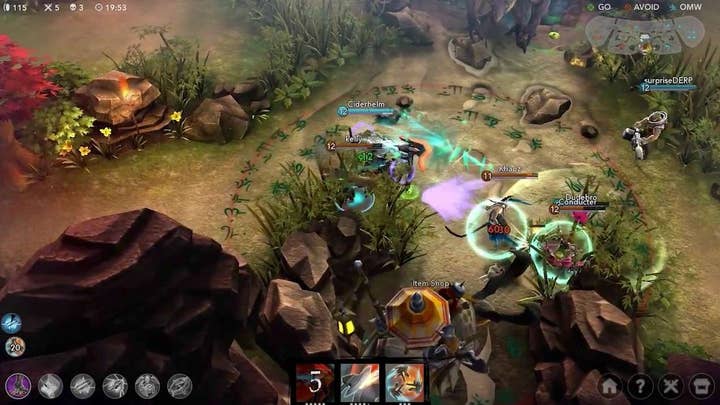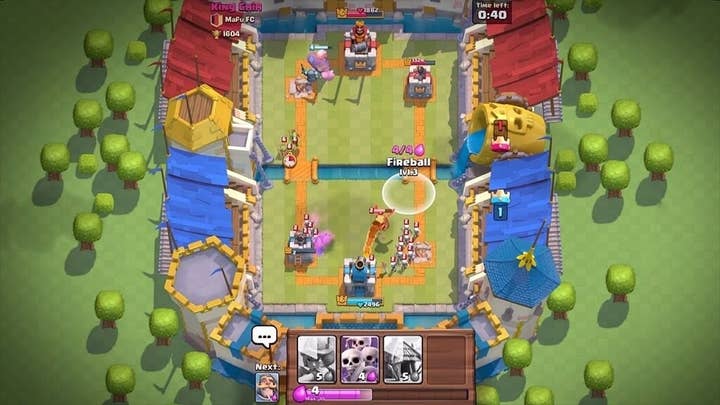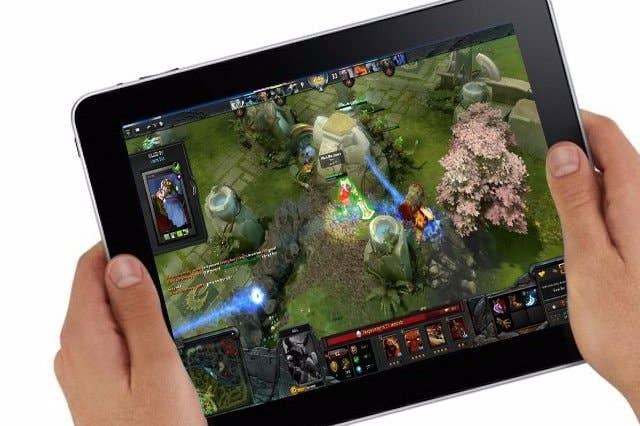MOBA: Truly embracing the mobile platform
Fast Forward Studios' Ivan Fedyanin on how to approach the design of a mobile MOBA and how to address the most common problems
There is a treasure in the mobile market, one that so far no one has managed to claim: a large audience of PC players who grew up playing large-scale online games: first-person shooters, MMORPGs, MOBAs, and so on. These players now have kids, other hobbies and full-time jobs. They're the same gamers they were before, but they simply no longer have time in their busy lives to play those games.
This subset of gamers is growing each and every year, and more and more developers want to capture the market they have created. It seems simple. We know what these gamers want, and the platform on which they would prefer to play: large-scale PC gameplay on mobile phones, catching a few minutes here and there.
If we made a full port of a big PC game to mobile we might reach this audience, but they'll only be able to play sitting on the couch or at a table, with a good wifi connection, with lots of free time to spare. And let's face it, if these conditions are met, the average player would probably prefer to open their laptop or fire up a console, not play the game on a smartphone. Simply emulating PC gameplay probably won't work out well, and that may be the reason why Super Evil Megacorp's Vainglory took so long to get traction in the market.
The alternative approach is to remove or oversimplify everything, leaving only the "spirit of the game." This sentiment can be read over and over in myriad press releases. The problem with this approach is clear: no matter how high quality the game, it will probably end up in the hands of an entirely different audience, while the intended audience will still be waiting for the game they want.

Balancing the "big experience" and the need for small slices
The only path to success is to constantly strive for balance between the 'big experience' and the player's need to consume that experience in small slices. We must "mobilise" our games by simplifying only those elements that are not essential to the experience. It calls to mind an old quote, attributed to Michelangelo, about how he created his statue of David: "It's easy. Just take away everything that doesn't look David." But please bear with me, and please note that, while I'm mainly talking about MOBAs, these points can be applied to any synchronous and competitive game.
"The path to success is to strive for balance between the 'big experience' and the player's need to consumer that experience in small slices"
Most of the following things are well-known to mobile developers, yet too many games are released that go against common sense and industry standards. I'm not talking about the core gameplay and the art, but the small things that are more likely to be overlooked or neglected.
Session length
Session length is a deceptively difficult problem. Short sessions restrict the number of developmental and tactical elements you can include. Longer sessions make it more likely that players will leave before it has resolved. The task, then, is to make sessions as short as possible while retaining strategic decisions and the opportunity for players to turn a likely defeat into a triumphant comeback. We should also leave the option open for short (10 to 15 second) absences from the game should the player receive an unexpected call. How long the ideal session is depends on the game, but anything over 5 to 10 minutes has to be very well justified.
Matchmaking
Time is also an important factor in matchmaking. Quality matchmaking, which takes player skill into account and only includes players from a single geographical area, should take no more than 30 seconds. Mobile players simply aren't willing to wait any longer than that. In part this is a technical issue, but also a question of achieving critical mass in terms of audience size, If a game cannot reach enough players initially for its matchmaking system to offer up a worthy opponent, it will enter the spiral of MOBA death: less DAU > worse matchmaking > even less DAU > even worse matchmaking.
Location and timing
"We need to make controlling characters just as comfortable and intuitive on a smartphone screen as it is with a mouse"
We believe that a player will think it would be nice to play "that MOBA game" about five times a day. However, they will actually be able to play on one of those five occasions, due to the need for an internet connection, distraction-free time (however little of it), and a relatively comfortable location (playing on a crowded bus while holding the handrail doesn't make for a great game against other players). We must concentrate on that one single time of the five when conditions will be ideal. For the other four, we can offer a different but also meaningful experience - another game mode more appropriate for a very short time period with limited access to the internet. If a player loads the game four times for short (and not necessarily online) sessions and is rewarded, it is very likely that they will select the same game in the evening when they get that one chance to really play.
Controls
Our potential players are at ease with a mouse and keyboard, and they surely have experience with accessible control systems from mobile games like Hearthstone. But how do we satisfy their needs for more complex gameplay as well as their need for a convincing mobile control scheme? The solution is not to reproduce mouse functionality on the phone, which has never been done well despite many attempts. We need to make controlling characters just as comfortable and intuitive on a smartphone screen as it is with a mouse. Since there is no ideal solution for this currently, we should experiment with several possible control systems. Also, allow certain aspects of the control scheme to be handled by AI, as this will help new players have a hassle-free experience and give them a better first impression.

Technology
If we set aside questions of genre and core gameplay for a minute and look just at the game's technical side, we can address a few interesting points. Despite incredible advances in technology that make it possible to make mobile games almost as beautiful as on consoles, with long game sessions and huge PvP combat, players - even mid-core players - still need simplicity. And simplicity shouldn't just be applied to gameplay, but to everything else.
Are we making our game in 3D graphics? We must first make sure it runs well on all devices, and disable post-processing effects if needed. That settled? Alright, now look at how much space the game takes, and 500MB to 1GB is unacceptable. We need to drive the build down to 100MB, and it will not suffice to have a login screen with a "Loading 1/1000 MB" message. The tutorial must be playable from the start at the very least.
"Players - even mid-core players - still need simplicity. And simplicity shouldn't just be applied to gameplay, but to everything else"
While we're on the subject, even if our game is a mobile RPG, nothing kills conversion rates like having to register before playing - even with "quick registration." The fundamental principle is a simple: tapping the icon on the home screen should begin gameplay, preferably within ten seconds. Greeting the player with a loading screen and a progress bar is terrible. We need a transition screen that disappears within two seconds, and make sure that each and every game window is able to load within that same timeframe.
And, finally, the hardest change to implement. A modern mobile game needs to execute as much code in the client app (not on the server) as possible, and all parts except PvP matches should work in offline mode. Users will not show understanding if a game session suddenly ends because they're in the subway and the internet service drops for a moment. Caching and delayed server validation are familiar technologies to any programmer. We must allow enough time to implement them properly.
Despite the fact that mobile games are increasingly moving towards core gameplay, "mobilizing" a MOBA project requires detailed research into games that keep it simple. Following that same approach in everything but tactical choices is the key to success.
Ivan Fedyanin is the Studio Director of Fast Forward, a My.com company. He has been making games for 14 years, with King's Bounty: Legions, Heroes of Might & Magic V and Etherlords among his shipped titles.
